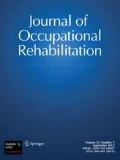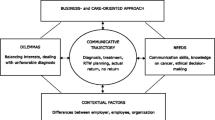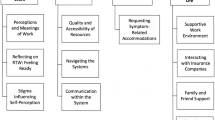Abstract
Purpose Research suggests that for many cancer survivors, returning to work has a range of benefits. However, considerable barriers have been identified as influencing the quality of return to work outcomes. This study explored the perspectives of Australian cancer survivors, managers and employee assistance program (EAP) professionals to gain an understanding of the return to work process and factors that affect the experience. Methods Focus groups and interviews were conducted with cancer survivors (n = 15), managers (n = 12), and EAP professionals / psychologists (n = 4) from public and private sectors. Thematic analysis was used to analyse the data to identify common and unique themes from the three participant groups. Results A range of drivers were identified including maintaining normality and regaining identity, which could act positively or negatively depending on survivors’ coping ability and self awareness. Analysis revealed communication difficulties in the workplace that impact on emotional and practical support. Negotiating an employee’s return is complex, influenced by the level of consultation with the employee and use of an ad hoc or structured process. Direct and indirect ways of supporting employees with cancer were identified, as was the need for colleague and manager support. Conclusion This study supports previous research findings of the impact of cancer on work, and reveals managers’ lack of knowledge on how to respond appropriately. The process of returning to work is complex, influenced by employees’ and managers’ attitudes, communication skills and coping abilities. Areas for workplace interventions to optimise support for the cancer survivor are described.

Similar content being viewed by others
Notes
An employer in Australia is required to provide a minimum of 10 days of sick leave, fully paid, per year. For the majority of employees, these ‘sick days’ do not accumulate and will be lost if not taken within a particular year. Although some social security benefits are available to cover unexpected periods of absence from work, payments are significantly lower than what an employee would typically earn whilst fully employed.
References
AIHW. ACIM (Australian Cancer Incidence and Mortality) books. In: Welfare AIoHa, editor. Canberra: AIHW; 2010.
De Boer AGEM, Verbeek JHAM, Spelten ER, Uitterhoeve ALJ, Ansink AC, De Reijke TM, et al. Work ability and return-to-work in cancer patients. Br J Cancer. 2008;98(8):1342–7.
De Boer AGEM, Taskila T, Ojajärvi A, Van Dijk FJH, Verbeek JHAM. Cancer survivors and unemployment a meta-analysis and meta-regression. JAMA. 2009;301(7):753–62.
Mehnert A. Employment and work-related issues in cancer survivors. Crit Rev Oncol Hematol. 2011;77(2):109–30.
Steiner JF, Cavender TA, Main DS, Bradley CJ. Assessing the impact of cancer on work outcomes: What are the research needs? Cancer. 2004;101(8):1703–11.
Gudbergsson SB, Fosså SD, Ganz PA, Zebrack BJ, Dahl AA. The associations between living conditions, demography, and the ‘impact of cancer’ scale in tumor-free cancer survivors: A NOCWO study. Support Care Cancer. 2007;15(11):1309–18.
Mahar KK, Brintzenhofeszoc K, Shields JJ. The impact of changes in employment status on psychosocial well-being: A study of breast cancer survivors. J Psychosoc Oncol. 2008;26(3):1–17.
Zebrack BJ, Yi J, Petersen L, Ganz PA. The impact of cancer and quality of life for long-term survivors. Psychooncology. 2008;17(9):891–900.
Kennedy F, Haslam C, Munir F, Pryce J. Returning to work following cancer: A qualitative exploratory study into the experience of returning to work following cancer. Eur J Cancer Care (Engl). 2007;16(1):17–25.
Amir Z, Neary D, Luker K. Cancer survivors’ views of work 3 years post diagnosis: A UK perspective. Eur J Oncol Nurs. 2008;12(3):190–7.
Main DS, Nowels CT, Cavender TA, Etschmaier M, Steiner JF. A qualitative study of work and work return in cancer survivors. Psychooncology. 2005;14(11):992–1004.
Van der Wouden JC, Greaves-Otte JGW, Greaves J, Kruyt PM, Van Leeuwen O, Van der Does E. Occupational reintegration of long-term cancer survivors. J Occup Med. 1992;34(11):1084–9.
Kagawa-Singer M. Redefining health: Living with cancer. Soc Sci Med. 1993;37(3):295–304.
Peteet JR. Cancer and the meaning of work. Gen Hosp Psychiatry. 2000;22(3):200–5.
Rasmussen DM, Elverdam B. The meaning of work and working life after cancer: An interview study. Psychooncology. 2008;17(12):1232–8.
Nachreiner NM, Dagher RK, McGovern PM, Baker BA, Alexander BH, Gerberich SG. Successful return to work for cancer survivors. AAOHN J. 2007;55(7):290–5.
Spelten ER, Verbeek JHAM, Uitterhoeve ALJ, Ansink AC, Van Der Lelie J, De Reijke TM, et al. Cancer, fatigue and the return of patients to work—a prospective cohort study. Eur J Cancer. 2003;39(11):1562–7.
Taskila T, Lindbohm ML. Factors affecting cancer survivors’ employment and work ability. Acta Oncol. 2007;46(4):446–51.
Taskila T, Martikainen R, Hietanen P, Lindbohm ML. Comparative study of work ability between cancer survivors and their referents. Eur J Cancer. 2007;43(5):914–20.
Wynn P. Employment and the common cancers: Overview. Occup Med. 2009;59(6):369–72.
Amir Z, Wynn P, Chan F, Strauser D, Whitaker S, Luker K. Return to work after cancer in the UK: attitudes and experiences of line managers. J Occup Rehabil. 2010;20(4):435–42.
McGrath P, Hartigan B, Holewa H, Skarparis M. Returning to work after treatment for haematological cancer: findings from Australia. Support Care Cancer. 2012;20(9):1957–64.
Braun V, Clarke V. Using thematic analysis in psychology. Qual Res Psychol. 2006;3(2):77–101.
Tong A, Sainsbury P, Craig J. Consolidated criteria for reporting qualitative research (COREQ): a 32-item checklist for interviews and focus groups. Int J Qual Health Care. 2007;19(6):349–57.
Holmgren K, Ivanoff SD. Supervisors’ views on employer responsibility in the return to work process. A focus group study. J Occup Rehabil. 2007;17(1):93–106.
Ahn E, Cho J, Shin DW, Park BW, Ahn SH, Noh DY, et al. Impact of breast cancer diagnosis and treatment on work-related life and factors affecting them. Breast Cancer Res Treat. 2009;116(3):609–16.
Bouknight RR, Bradley CJ, Luo Z. Correlates of return to work for breast cancer survivors. J Clin Oncol. 2006;24(3):345–53.
Ashing-Giwa KT, Lim JW. Exploring the association between functional strain and emotional well-being among a population-based sample of breast cancer survivors. Psychooncology. 2010;19(2):150–9.
Maunsell E, Drolet M, Brisson J, Brisson C, Mâsse B, Deschênes L. Work situation after breast cancer: Results from a population-based study. J Natl Cancer Inst. 2004;96(24):1813–22.
Molina R, Feliu J, Villalba A, San José B, Jiménez AM, Espinosa E, et al. Employment in a cohort of cancer patients in Spain. A predictive model of working outcomes. Clin Transl Oncol. 2008;10(12):826–30.
Yarker J, Munir F, Bains M, Kalawsky K, Haslam C. The role of communication and support in return to work following cancer-related absence. Psychooncology. 2009 Dec 14. PubMed PMID: 20014202. Epub 2009/12/17. Eng.
Maunsell E, Brisson C, Dubois L, Lauzier S, Fraser A. Work problems after breast cancer: An exploratory qualitative study. Psychooncology. 1999;8(6):467–73.
Verbeek JH. How can doctors help their patients to return to work? PLoS Med. 2006;3(3):312–5.
Fadyl JK, McPherson KM, Schlter PJ, Turner-Stokes L. Factors contributing to work-ability for injured workers: Literature review and comparison with available measures. Disabil Rehabil. 2010;32(14):1173–83.
Franche RL, Cullen K, Clarke J, Irvin E, Sinclair S, Frank J. Workplace-based return-to-work interventions: a systematic review of the quantitative literature. J Occup Rehabil. 2005; 15(4):607–31. PubMed PMID: 16254759. Epub 2005/10/29. eng.
Munir F, Jones D, Leka S, Griffiths A. Work limitations and employer adjustments for employees with chronic illness. Int J Rehabil Res. 2005;28(2):111–7.
Pryce J, Munir F, Haslam C. Cancer survivorship and work: Symptoms, supervisor response, co-worker disclosure and work adjustment. J Occup Rehabil. 2007;17(1):83–92.
Short PF, Vasey JJ, BeLue R. Work disability associated with cancer survivorship and other chronic conditions. Psychooncology. 2008;17(1):91–7.
Calvio L, Peugeot M, Bruns GL, Todd BL, Feuerstein M. Measures of cognitive function and work in occupationally active breast cancer survivors. J Occup Environ Med. 2010;52(2):219–27.
Nowrouzi B, Lightfoot N, Cote K, Watson R. Workplace support for employees with cancer. Curr Oncol. 2009;16(5):15–22.
Worcester R. World questions global index of fear. London: King’s College; 2010.
Acknowledgments
Thank you also to the support provided by Cancer Voices SA. This work was supported via a scholarship provided by Cancer Council SA and Cancer Australia through its ‘Building Better Cancer Support Through Consumers’ initiative.
Author information
Authors and Affiliations
Corresponding author
Rights and permissions
About this article
Cite this article
McKay, G., Knott, V. & Delfabbro, P. Return to Work and Cancer: The Australian Experience. J Occup Rehabil 23, 93–105 (2013). https://doi.org/10.1007/s10926-012-9386-9
Published:
Issue Date:
DOI: https://doi.org/10.1007/s10926-012-9386-9




